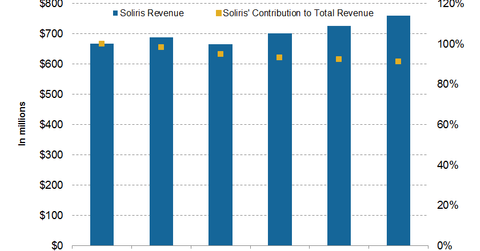What Are the Drivers behind the Success of Soliris?
Following analysts’ projections, Soliris revenues in 3Q16 and 4Q16 should rise 9.0% and 10.0%, respectively, YoY to reach $725.9 million and $760.6 million, respectively.
Oct. 20 2016, Updated 8:06 a.m. ET

Revenue projections for Soliris
Alexion Pharmaceuticals’ (ALXN) key drug Soliris is indicated for PNH (paroxysmal nocturnal hemoglobinuria) and aHUS (atypical hemolytic uremic syndrome). To find out how the aHUS space presents a bigger opportunity for Soliris, please read How Significant Is Alexion’s Opportunity with Soliris?
Following Wall Street analysts’ projections, Soliris revenues in 3Q16 and 4Q16 should rise 9.0% and 10.0%, respectively, YoY (year-over-year) to reach $725.9 million and $760.6 million, respectively. Alexion expects the drug to add $2.8 billion–$2.9 billion in 2016 against $2.6 billion in 2015. Now let’s look at the drivers behind its revenue growth.
Understanding the revenue drivers for Soliris
Although Soliris has been around for almost a decade, Alexion is continuously identifying and treating new PNH and aHUS patients. Soliris recorded a 15.0% rise in volume on a yearly basis in 2Q16. Following the transformative benefits of the drug, patients are surviving longer, and thus the drug is serving a larger patient pool.
The second opportunity for the drug is potential label expansion in neuromyelitis optica and DGF (delayed graft function). To find out about the studies for these indications, please refer to What Are the Additional Labels for Alexion’s Soliris?
Although Alexion’s REGAIN study failed to meet the primary endpoint for treating myasthenia gravis, the company is in discussions with regulatory authorities and will provide an update on the program by the end of 2016. The drug can be used off-label in myasthenia gravis.
In the next part of this series, we’ll look at some of the headwinds for the drug.
If you want to enjoy exposure to Alexion, you can invest in ETFs in order to reduce your direct equity risk exposure. One option is the First Trust NYSE Arca Biotechnology ETF (FBT), which holds 3.4% in Alexion. The fund also invests in Biogen Idec (BIIB), Regeneron (REGN), and Celgene (CELG).
